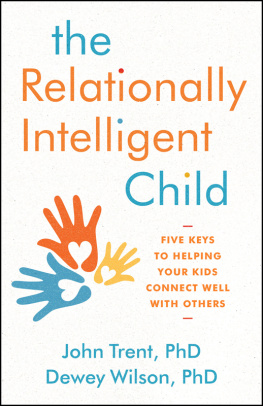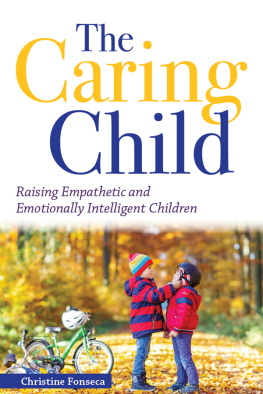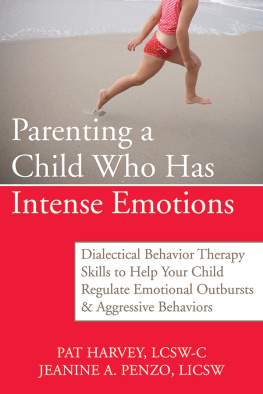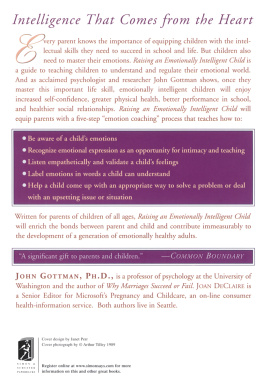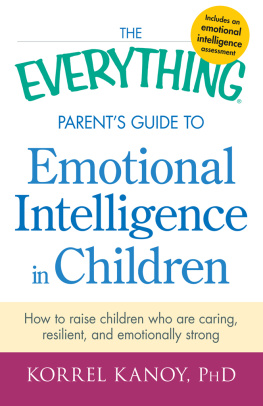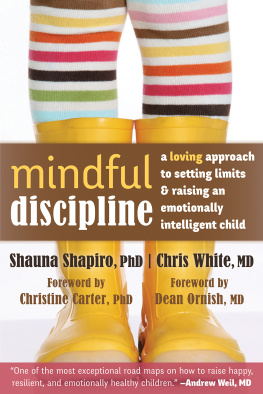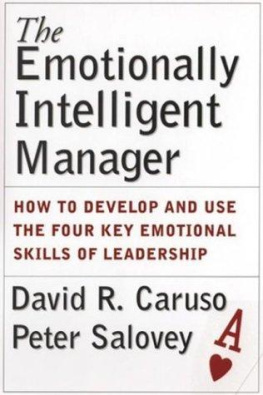
Thank you for purchasing this Simon & Schuster eBook.
Sign up for our newsletter and receive special offers, access to bonus content, and info on the latest new releases and other great eBooks from Simon & Schuster.

or visit us online to sign up at
eBookNews.SimonandSchuster.com

ALSO BY JOHN GOTTMAN
Why Marriages Succeed or Fail
(with Nan Silver)


SIMON & SCHUSTER PAPERBACKS
ROCKEFELLER CENTER
1230 AVENUE OF THE AMERICAS
NEW YORK, NY 10020
www.SimonandSchuster.com
COPYRIGHT 1997 BY JOHN GOTTMAN
ALL RIGHTS RESERVED, INCLUDING THE RIGHT OF REPRODUCTION IN WHOLE OR IN PART IN ANY FORM.
PREVIOUSLY PUBLISHED AS The Heart of Parenting.
SIMON & SCHUSTER PAPERBACKS AND COLOPHON ARE REGISTERED TRADEMARKS OF SIMON & SCHUSTER, INC.
FOR INFORMATION ABOUT SPECIAL DISCOUNTS FOR BULK PURCHASES, PLEASE CONTACT SIMON & SCHUSTER SPECIAL SALES: 1-800-456-6798 OR BUSINESS@SIMONANDSCHUSTER.COM.
DESIGNED BY BARBARA M. BACHMAN
MANUFACTURED IN THE UNITED STATES OF AMERICA
20 19 18 17 16
THE LIBRARY OF CONGRESS HAS CATALOGED THE HARDCOVER EDITION AS FOLLOWS: GOTTMAN, JOHN MORDECHAI.
THE HEART OF PARENTING : HOW TO RAISE AN EMOTIONALLY INTELLIGENT CHILD / JOHN GOTTMAN WITH JOAN DECLAIRE.
P. CM.
INCLUDES BIBLIOGRAPHICAL REFERENCES.
1. EMOTIONS IN CHILDREN. 2. EMOTIONS IN ADOLESCENCE. 3. CHILD REARING. 4. PARENTING. I. DECLAIRE, JOAN. II. TITLE.
BF723.E6G67 1997
649. 1DC 20 96-38947
ISBN-13:978-0-684-80130-8
ISBN-10: 0-684-80130-2
eISBN-13: 978-1-4391-2616-5
ISBN-13:978-0-684-83865-6 (PBK)
ISBN-10: 0-684-83865-6 (PBK)
ACKNOWLEDGMENTS
THE IDEA FOR THIS RESEARCH ON META-EMOTION WAS conceived in 1984 when John Gottman was on leave, visiting Robert Levenson in Paul Ekmans laboratory in San Francisco. The research could not have progressed without the support of Robert Levenson, who built Gottmans first psychophysiology laboratory. This was the first study we did in that lab. The research has also received a great deal of support from Dr. Michael Guralnick, director of the Center for Human Developmental Disabilities (CHDD), and CHDDs core facilities, particularly the Instrument Development Laboratory at the University of Washington. The research was supported by National Institute of Mental Health research grants MH42484, titled Marital discord, parenting, and child emotional development, MH35997, titled Friendship formation among children, an NIMH Merit Award to extend research in time, and Research Scientist Award K2MH00257 awarded to John Gottman. Gottman wishes to acknowledge the great love, help, and intellectual companionship of his wife, Julie Schwartz Gottman, who coleads parent training groups at their Seattle Marital and Family Institute and who has been a true partner in parenting. Gottman also wishes to acknowledge the great love, patience, and teaching skill of his daughter, Moriah. Thanks to Mark Malone for his comments as a careful reader and devoted dad. Thanks also to writer Sondra Kornblatt for her insightful feedback on our manuscript.
To the work and memory of Dr. Haim Ginott
CONTENTS
RAISING AN EMOTIONALLY INTELLIGENT CHILD
FOREWORD
THESE ARE HARD TIMES FOR CHILDREN, AND SO FOR PARENTS. There has been a sea change in the nature of childhood over the last decade or two, one that makes it harder for children to learn the basic lessons of the human heart and one that ups the ante for parents who used to pass these lessons on to the children they love. Parents have to be smarter about teaching their children basic emotional and social lessons. In this practical guide for good parenting, John Gottman shows how.
The need may never have been more pressing. Consider the statistics. Over the last few decades the number of homicides among teenagers has quadrupled, the number of suicides has tripled, forcible rapes doubled. Beneath headline-grabbing statistics like these lies a more general emotional malaise. A nationwide random sample of more than two thousand American children, rated by their parents and teachersfirst in the mid-1970s and then in the late 1980sfound a long-term trend for children, on average, to be dropping in basic emotional and social skills. On average, they become more nervous and irritable, more sulky and moody, more depressed and lonely, more impulsive and disobedientthey have gone down on more than forty indicators.
Behind this deterioration lie larger forces. For one, the new economic realities mean parents have to work harder than earlier generations to support their familieswhich means that most parents have less free time to spend with their children than their own parents had to spend with them. More and more families live far from relatives, often in neighborhoods where parents of young children are afraid to let them play on the streets, let alone visit a neighbors house. And more and more hours in childrens lives are spent staring at a video screenwhether watching TV or looking at a computer monitorwhich means they are not out playing with other children.
But in the long spread of human history, the way children have learned basic emotional and social skills has been from their parents and relatives, from neighbors, from the rough-and-tumble of play with other children.
The consequences of failing to learn the basics of emotional intelligence are increasingly dire. Evidence suggests, for example, that girls who fail to learn to distinguish between feelings like anxiety and hunger are most at risk for eating disorders, while those who have trouble controlling impulses in the early years are more likely to get pregnant by the end of their teen years. For boys, impulsivity in the early years may augur a heightened risk of delinquency or violence. And for all children, an inability to handle anxiety and depression increases the likelihood of later abusing drugs or alcohol.
Given these new realities, parents need to make the best use of the golden moments they have with their children, taking a purposeful and active role in coaching their children in key human skills like understanding and handling troubling feelings, controlling impulse, and empathy. In Raising an Emotionally Intelligent Child, John Gottman offers a scientifically grounded, eminently practical way for parents to give their children an essential tool kit for life.
Daniel Goleman, author of
Emotional Intelligence
PREFACE
BEFORE I BECAME A FATHER, I HAD SPENT NEARLY TWENTY years working in the field of developmental psychology, studying the emotional lives of children. But it was not until our daughter, Moriah, arrived in 1990 that I began truly to understand the realities of the parent-child relationship.
Like so many parents, I could not have imagined the intensity of feeling I would have for my child. I had no idea how thrilled I would be when she first learned to smile, to talk, to read a book. I did not anticipate how much patience and attention she would require from me minute by minute. Nor did I know how willing I would be to give her all the attention she needed. On the other hand, I was surprised at how frustrated, disappointed, and vulnerable I could sometimes feel. Frustrated when she and I couldnt communicate. Disappointed when she misbehaved. Vulnerable when I had to acknowledge how dangerous the world could be; how losing her would mean losing everything.
Next page


